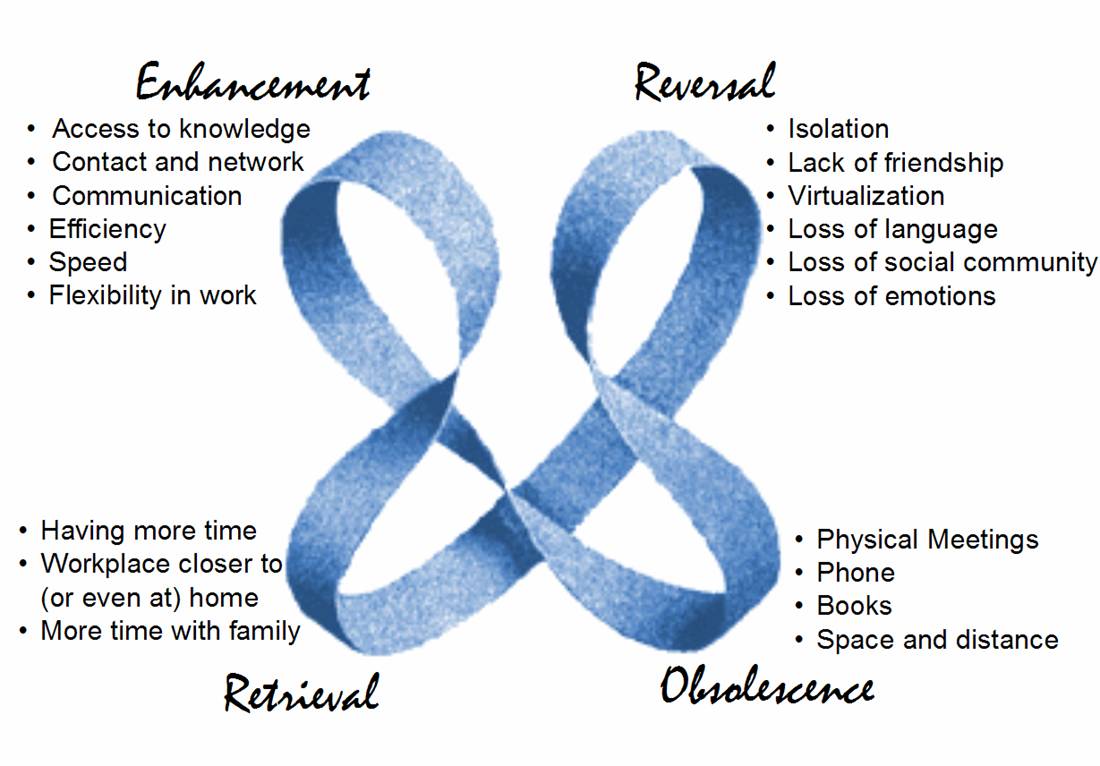The why-do-we-all-put-our-names-now? essay from Ute
McLuhan: "Why is it so easy to acquire the solutions of past problems and so difficult to solve current ones?"
Our daily life is more and more determined by gathering, processing and creating information. The speed and reach of access to information transforms our world into an information society. The rapid enhancement of technology over the past decades made information available nearly anywhere at anytime and in any way – written or oral.
Although technology seems to be the driving factor, I believe that the speed of technological innovations is even too high for the society to cope with. From my perspective it is more the social environment that determines the speed and also the intensity with which the information society changes than the technology itself.
When we look at our personal lives we can even see that the generation that is just one level above us – like our parents and other people in the age of around 60 - has much more difficulties to adapt their lives to the changes technology caused. And the same will be with the next generation that comes after us – our children will grow up with a computer and even use it for playing games before they can write.
These examples from daily life show how the information society really affects our lives. Although it offers a lot of interesting opportunities it is also threatening as it will cause changes to the way of living we are used to and which we also like.
The way the information society will look like will also depend much on how it will be regulated and which governmental steps will be undertaken in the future. In my opinion, the awareness is currently not high enough that political steps are necessary to direct the information society in a helping, live-improving way.
In addition to the storytelling approach for the Future of the Internet that focuses on changes in private life, I complement the vision with an outlook on changes in professional life.
Today’s business world faces several pressures – globalization, increased competition, scarcity of resources etc. As the global economy is going through a recession, cost-cutting and efficiency gains are becoming even more important. In addition to these factors also the speed of change in technology sharpens the business world. The way people work is strongly influenced by the technology they are using – communication is a crucial factor. The internet facilitates an everywhere-anytime communication and increases speed. Distance in space is becoming obsolete.
These macro-level factors influence the way business is carried out. Firms operate more and more in networks, people work from home and are not always physically but only virtually present in their offices, hierarchies are becoming flatter and tasks are decentralized and flexibility and efficiency are key vocabularies used. This will influence the intensity of belonging and might even drive isolation of people.
By offering suitable communication facilities, the information society can support this process and make communication in professional life easier. Nevertheless, the people have to be ready for this change. They have to adapt to the needs of business, but not to the needs of technology. Technology should only be a facilitator but not the main driving force. Of course, also the acceptance of the facilitator will again shape the behaviour and so on, but the causal relationship scheme should start with individual behaviour first and with technology next.
To emphasize different perspectives of these changes in the information society, McLuhan’s tetrad is a valuable framework. The tetrad allowed McLuhan to apply four laws, framed as questions:
- What does the information society extend?
- What does information society make obsolete?
- What is retrieved that was previously obsolesced or abandoned?
- What does the information society reverse into if it is fully utilized or over-extended?
Applied to the information society of the future the tetrad shows the following critical view:

This analysis shows very well that there are several opportunities related to the potential future of the information society as well as also threats and somehow even surprises none is currently considering. A careful consideration of the different dimensions like political-economical-social-technological-environmental (PESTE) is therefore necessary to influence the future in a direction we prefer.